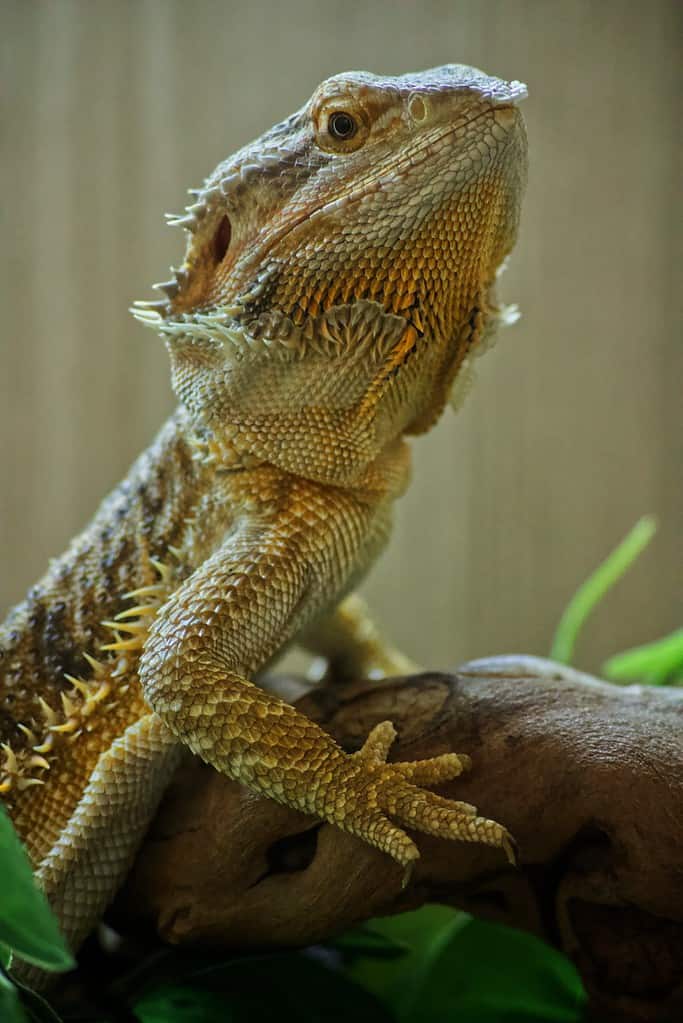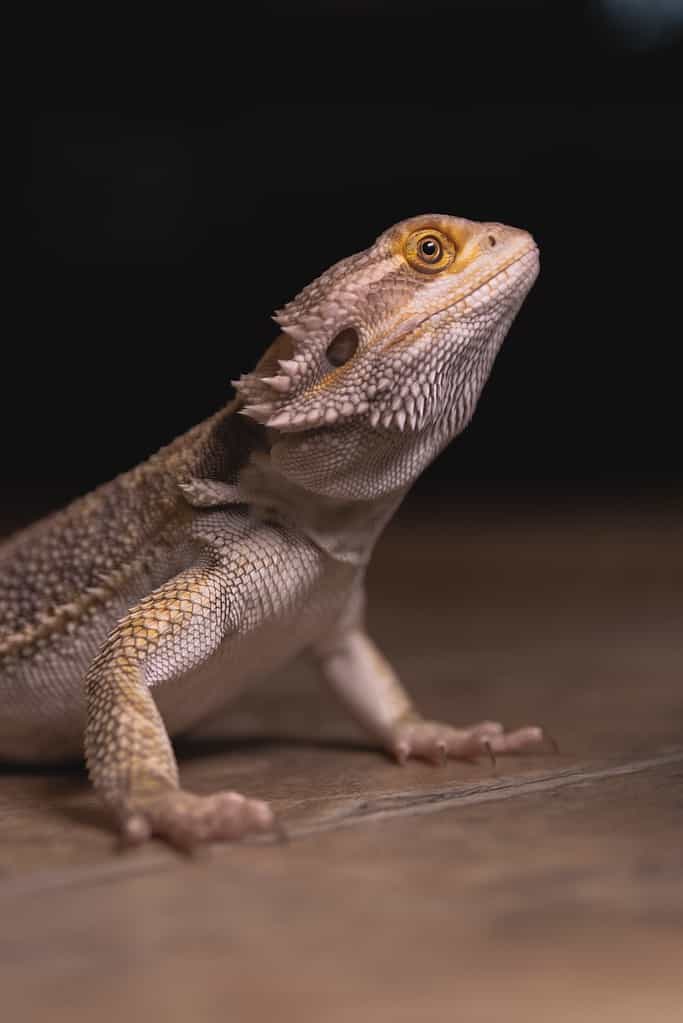Bearded dragons’ popularity has skyrocketed recently, yet they are still regarded as exotic pets due to their unique dietary needs. So, what can a bearded dragon eat?

Bearded dragons eat both plants and animals, which means they are omnivores. When they are very young, bearded dragons consume around 80% insects and 20% plants. However, in some cases, owners have difficulty encouraging their dragons to consume any veggies while they are in this stage. Adult bearded dragons eat 80% vegetation and 20% insects.
This article will give all the information you want concerning the proper diet for your bearded dragon.
What Insects and Bugs Bearded Dragons Eat?
Bearded dragons will consume almost any moving insect, but their owner must ensure they only consume safe bugs. These are the most popular insects that bearded dragon owners may give their pets to eat:
Crickets
Bearded dragons eat a wide variety of feeder insects, but crickets are among the most common and should be a major ingredient in your pet’s diet. Feeder crickets are wonderful for young bearded dragons since they include a lot of protein and a healthy dose of Calcium. It’s also a great idea to increase the crickets’ nutrition by adding powders or gelatin pieces.
Mealworms
Mealworms grown in captivity are a nice food source for the full-grown bearded dragon, just like crickets. You should, however, stay clear of giving them to young bearded dragons because their gullets aren’t nearly big enough to accommodate one of these worms. Because of their significant amount of fat, they are not recommended as a regular part of their diet. Because of the smaller amount of fat they contain, Silkworms provide an option that is more nutritionally sound.
Dubia Roaches
Aside from crickets, dubia roaches are another common source of nutrition for bearded dragons, and they are nearly as simple to discover as crickets. You won’t have to worry about these insects fleeing because they are docile and don’t jump or climb. If you have a dark room in your home where they may be housed, you can breed them there. In addition, their lifespan is far greater than that of crickets, and unlike other insects, they do not carry any parasites with them.
Which Vegetables and Fruits Can Bearded Dragons Eat?
Bearded dragons can consume a wide variety of vegetables and fruits without risking their health. Bearded dragons consume raw and cooked vegetables. But raw vegetables are better than cooked ones because they have more nutrients. Here are the most common veggies you may give your bearded dragon daily:
Carrots
The amount of calcium to phosphorus found in carrots is about average, and they are an excellent source of vitamin A. This is an excellent treat for your bearded dragon and makes a lovely addition to their salads. They also have a lot of water, which will assist in keeping your bearded dragon hydrated.
Peas
Peas are completely safe for your pet bearded dragon to consume. They provide specific health benefits due to the higher Calcium content, low Phosphorus level, and high Vitamin A concentration. However, compared to the amount of calcium it contains, the amount of phosphorus in it is quite a bit lower; in fact, it is so much lower that it throws off the optimal ratio and makes it a poor alternative for vegetables that are healthier for you. Your pet should only consume this in minimal amounts.
Cauliflower
Cauliflower is one of the foods that may be given to your bearded dragon, but there is very little need for you to do so. When it comes to the proper diet of your bearded dragon, this vegetable only has a trace quantity of the essential vitamins needed to keep them healthy. This vegetable is also saturated, making it much worse because it will just fill your pet’s stomach with waste.
What Kinds of Fruits Can Bearded Dragons Eat?
The Bearded Dragon can consume a broad assortment of fruits in addition to the veggies it may eat. Here are the most common fruits your bearded dragon can eat.
Apples
Apples are safe for bearded dragons to consume; however, you should carefully chop each piece to ensure that your beardie does not injure itself while eating the fruit. Cut the pieces, so they are no bigger than the distance between their eyes. Apples, like grapes, offer a good balance of calcium to phosphorus in their composition, but they are deficient in the amounts of vitamins A and D that the body needs.
Strawberries
Strawberry is one of the few foods that bearded dragons can eat, but it has almost no nutritional value. First, these fruits are mostly water, so they’re full but lack nutrient value. In the same vein, strawberries have an inadequate ratio of calcium to phosphorus in their composition. If you feed your bearded dragon a strawberry, you probably won’t hurt him, but you also won’t do much good for him!
Bananas
Although the high potassium level of bananas is considered beneficial for human health, bearded dragons do not derive any nutritional value from this property of bananas. Therefore, although there are no known health risks associated with feeding this fruit to your bearded dragon, it does not contribute much to the beardie’s diet and is more appropriate as a supplemental snack.
Supplements
Your Bearded Dragon needs a calcium and vitamin D3 supplement in addition to a varied diet of insects, fruit, and vegetables to help prevent a calcium deficit. Most owners sprinkle the powdered supplement onto the insects before feeding them to their pets; however, the supplement may also be applied to fruits and vegetables. If you want the greatest results, following the directions on the packaging is highly recommended.

How Much Should My Bearded Dragon Be Fed?
Bearded dragons achieve adulthood and sexual maturity at about 18 months of age. Bearded dragons can live up to 30 years. At this age, they will only eat twice a day.
Provide your dragon with insects and let it feed for 10 minutes to discover how much it needs to eat. After one minute, throw away any bugs that were left unconsumed.
When it comes to fruits as well as vegetables, you should only leave them in your dragon’s cage for about half an hour. This will give your dragon enough time to eat to its satisfaction without causing it to be overfed. This prevents any mold from growing on the food that has been left over.
What Do Baby Bearded Dragons Like to Eat Best?
Calcium is essential for young bearded dragons, especially when growing their bones. Newborn beardies can get metabolic bone disease at a young age if they do not acquire enough of it at a young age. This will have a significant and detrimental impact on their quality of life. They also require a lot of protein at a young age, and the best way to provide it for them is by consuming insects sprinkled with calcium powder.
What Should a Bearded Dragon Not Eat?
It’s just as helpful to know what not to feed the bearded dragon as it is to know what to feed it. Beardies can’t eat some foods since they aren’t good for them, while other foods can be quite harmful to them if they consume them.
These are some examples of foods that should not be given to your bearded dragon:
- Crocus
- Buttercup
- Lettuce
- Avocados
- Lightning bugs
- Horse chestnut
- Poppies
- Fish
- Daffodil
- Fireflies
- Ivy
- Rhubarb
- Wasps
- Elder bugs
- Poppies
- Bees
- Scorpions
- Seafood
